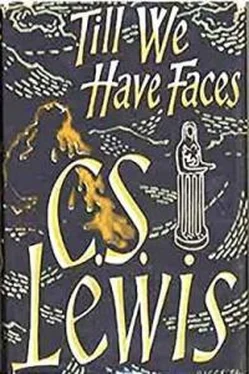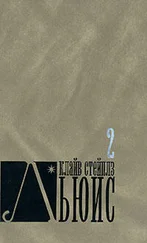Very early in the writing there came also a stroke from without. While I related my first years, when I wrote how Redival and I built mud houses in the garden, a thousand other things came back into my mind, all about those days when there was no Psyche and no Fox; only I and Redival. Catching tadpoles in the brook, hiding from Batta in the hay, waiting at the door of the hall when our father gave a feast and wheedling titbits out of the slaves as they went in and out. And I thought, how terribly she changed. This, all within my own mind. But then the stroke from without. On top of many other hindrances came word of an embassy from the Great King who lives to the South and East.
“Another plague,” said I. And when the strangers came (and there must be hours of talk, and a feast for them afterwards) I liked them none the better for finding that their chief man was a eunuch. Eunuchs are very great men at that court. This one was the fattest man I ever saw, so fat his eyes could hardly see over his cheeks, all shining and reeking with oil, and tricked out with as much doll–finery as one of Ungit’s girls. But as he talked and talked I began to think there was a faint likeness in him to someone I had seen long ago. And, as we do, I chased it and gave it up, and chased it and gave it up again, till suddenly, when I least thought of it, the truth started into my mind and I shouted out, “Tarin!”
“Oh yes, Queen, oh yes,” said he, spiteful–pleased (I thought) and leering. “Oh yes, I was him you called Tarin. Your father did not love me, Queen, did he? But … te–hee, te–hee … he made my fortune. Oh yes, he set me on the right road. With two cuts of a razor. But for him I should not have been the great man I am now.”
I wished him joy of his advancement.
“Thank you, Queen, thank you. It is very good. And to think (te–hee) that but for your father’s temper I might have gone on carrying a shield in the guard of a little barbarous king whose whole kingdom could be put into one corner of my master’s hunting park and never be noticed! You will not be angry, no?”
I said I had always heard that the Great King had an admirable park.
“And your sister, Queen?” said the eunuch. “Ah, she was a pretty little girl … though, te–hee, te–hee, I’ve had finer women through my hands since … is she still alive?”
“She is the Queen of Phars,” said I.
“Ah, so. Phars. I remember. One forgets the names of all these little countries. Yes … a pretty little girl. I took pity on her. She was lonely.”
“Lonely?” said I.
“Oh yes, yes, very lonely. After the other princess, the baby, came. She used to say, ‘First of all Orual loved me much; then the Fox came and she loved me little; then the baby came and she loved me not at all.’ So she was lonely. I was sorry for her … te–hee–hee … Oh, I was a fine young fellow then. Half the girls in Glome were in love with me.” I led him back to our affairs of state.
This was only the first stroke, a light one; the first snowflake of the winter that I was entering, regarded only because it tells us what’s to come. I was by no means sure that Tarin spoke truly. I am sure still that Redival was false and a fool. And for her folly the gods themselves cannot blame me; she had that from her father. But one thing was certain; I had never thought at all how it might be with her when I turned first to the Fox and then to Psyche. For it had been somehow settled in my mind from the very beginning that I was the pitiable and ill–used one. She had her gold curls, hadn’t she?
So back to my writing. And the continual labour of mind to which it put me began to overflow into my sleep. It was a labour of sifting and sorting, separating motive from motive and both from pretext; and this same sorting went on every night in my dreams, but in a changed fashion. I thought I had before me a huge, hopeless pile of seeds, wheat, barley, poppy, rye, millet, what not? and I must sort them out and make separate piles, each all of one kind. Why I must do it, I did not know; but infinite punishment would fall upon me if I rested a moment from my labour or if, when all was done, a single seed were in the wrong pile. In waking life a man would know the task impossible. The torment of the dream was that, there, it could conceivably be done. There was one chance in ten thousand of finishing the labour in time, and one in a hundred thousand of making no mistake. It was all but certain I should fail, and be punished; but not certain. And so to it: searching, peering, picking up each seed between finger and thumb. Yet not always finger and thumb. For in some dreams, more madly still, I became a little ant, and the seeds were as big as millstones; and labouring with all my might, till my six legs cracked, I carried them to their places; holding them in front of me as ants do, loads bigger than myself.
One thing that shows how wholly the gods kept me to my two labours, the day’s and the night’s, is that all this time I hardly gave Bardia a thought, save to grumble at his absence because it meant that I was more hindered in my writing. While the rage of it lasted nothing seemed to matter a straw except finishing my book. Of Bardia I only said (once and again), “Does he mean to slug abed for the rest of his life?” or, “It’s that wife of his.”
Then there came a day when that last line of the book ( they have no answer ) was still wet, and I found myself listening to Arnom and understanding, as if for the first time, what his looks and voice meant. “Do you mean,” I cried, “that the Lord Bardia is in danger?”
“He’s very weak, Queen,” said the priest. “I wish the Fox were with us. We are bunglers, we of Glome. It seems to me that Bardia has no strength or spirit to fight the sickness.”
“Good gods,” said I, “why did you not make me understand this before? Ho! Slave! My horse. I will go and see him.”
Arnom was an old and trusted counsellor now. He laid his hand on my arm. “Queen,” he said gently and very gravely, “it would make him the less likely to recover if you now went to him.”
“Do I carry such an infection about me?” said I. “Is there death in my aspect, even through a veil?”
“Bardia is your loyalest and most loving subject,” said Arnom. “To see you would call up all his powers; perhaps crack them. He’d rouse himself to his duty and courtesy. A hundred affairs of state on which he meant to speak to you would crowd into his mind. He’d rack his brains to remember things he has forgotten for these last nine days. It might kill him. Leave him to drowse and dream. It’s his best chance now.”
It was as bitter a truth as I’d ever tasted, but I drank it. Would I not have crouched silent in my own dungeons as long as Arnom bade me if it would add one featherweight to Bardia’s chance of life? Three days I bore it (I, the old fool, with hanging dugs and shrivelled flanks). On the fourth I said, “I can bear it no longer.” On the fifth Arnom came to me, himself weeping, and I knew his tidings without words. And this is a strange folly, that what seemed to me worst of all was that Bardia had died without ever hearing what it would have shamed him to hear. It seemed to me that all would be bearable if, once only, I could have gone to him and whispered in his ear, “Bardia, I loved you.”
When they laid him on the pyre I could only stand by to honour him. Because I was neither his wife nor kin, I might not wail nor beat the breast for him. Ah, if I could have beaten the breast, I would have put on steel gloves or hedgehog skins to do it.
I waited three days, as the custom is, and then went to comfort (so they call it) his widow. It was not only duty and usage that drove me. Because he had loved her she was, in a way, surely enough, the enemy; yet who else in the whole world could now talk to me?
Читать дальше











